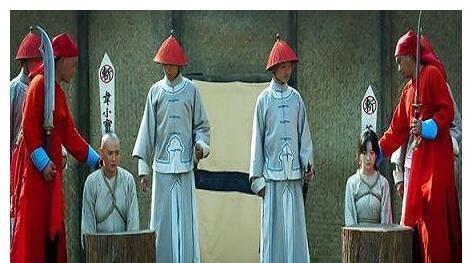Since ancient times, there has been a saying that "debts are repaid, killing people to pay for their lives", no matter which dynasty in history, there are some tortures, and some benevolent emperors may feel that punishments such as Ling Chi and Che Rift are too cruel and order them to be abolished. However, throughout the more than two thousand years of feudal society, there is absolutely no mercy and softness towards those who commit great adultery and evil, especially those who rebel against a certain offender, and basically the death penalty is imposed.
Friends who like to watch costume dramas often see such a scene: the prisoner is about to be beheaded, the executioner's knife is ready, and a shout suddenly comes from the distance - leave people under the knife. The overseer shouted angrily at the executioner, "Leave him alone, cut him off quickly." In fact, as long as the four words "leave people under the knife" are heard, even if the supervisor gives the order, the executioner does not dare to continue the execution.

It can be seen from the historical books that the ancient local government was only responsible for carrying out orders, did not have the power to directly execute prisoners, and the death penalty case was of great importance, first submitted to the Punishment Department for examination, and then decided by the emperor. In ancient times, the productive forces were not developed, belonged to the small peasant economy, and it required a lot of manpower to cultivate the land, except for a very few faint emperors, the general emperors would not easily execute prisoners, but changed to border or exile.
During the Tang Dynasty, the imperial court attached great importance to death penalty cases, and once there was a fold and sent to the palace, the emperor was cautious. The three division chiefs first discussed whether they met the death penalty criteria, and the result of the deliberation was only a reference, not a final decision, because the decision was in the hands of the emperor, and it must be reported to the emperor three times to avoid misjudgment, after all, the emperor was in a good situation, and there may be a situation of wandering.
The "Tang Law" records: "Prisoners of death row, who are said to have played the paintings and should be executed, are all repeated three times, and then the decision begins." "In ancient times, the death penalty was divided into two types, one was a beheading, that is, an immediate execution, or even executed on the same day. The other is to behead the prisoner, similar to the death delay, that is, the meaning of the autumn queen to ask the beheading, if after a retrial, the emperor believes that he will not die of sin, or if he is lucky, he will be able to escape the disaster when he encounters amnesty.
"Leaving people under the knife" is not only in film and television dramas, such things have happened in history, and more than once. Han Xin followed Xiang Yu not to be reused, and in a fit of anger, he defected to Liu Bang, who took him in, but did not feel how strong Han Xin's ability was, and arranged a position for him as a warehouse manager. Bad luck, drinking cold water are stuffed teeth, Han Xin, who has no fault, because he was implicated by people, sat down to be beheaded.
Calling the heavens and the earth ungodly, Han Xin was simply more wronged than Dou E, seeing that he was about to be beheaded, Han Xin did not want to be killed inexplicably. Just as Xiahou Infant was passing by, Han Xin seemed to see hope and shouted at Xiahou Infant: "Doesn't the King of Han (Liu Bang) want to win the world?" Why kill a hero for no reason? Xiahou Infant was stunned, touched by Han Xin's courage and boldness, and let the executioner leave someone under the knife.
Xiahou Bao was Liu Bang's favorite, and the executioner did not dare not give him face, and even thought that the release of Han Xin was Liu Bang's intention. Xiahou Infant found Liu Bang and personally vouched for Han Xin, and Liu Bang affirmed that he would give face, ordered that Han Xin not be held responsible, and put him in charge of managing the grain. It can be seen from this that not only can the emperor order "leave people under the sword", but for the important courtiers of the court, they also have the right to rescue people from the executioner.
At best, the executioner is only responsible for the execution, working according to the regulations, and once he hears the phrase "leave people under the knife", he has no choice but to stop, otherwise he will kill the wrong person, and he cannot bear this responsibility. In addition, if the death row inmate shouts for his own injustice before the execution, the executioner must also stop and quickly report it to the prison officer, why should he do this? Originally, there was a stipulation in the ancient law: "Whoever is sentenced to death and is wronged shall be questioned again." ”
To put it simply, to prevent unjust, false and wrongly decided cases from occurring, people will die and their words are also good, if the prisoner still shouts injustice before dying, there is a good chance that he has been wronged, which is equivalent to shouting "leave people under the knife" for himself. In summary, the executioner is only a part-time worker, in the case of "leaving people under the knife", continuing to execute will cause trouble to the upper body, immediately stopping is the wisest choice, regardless of whether the final death row inmate can be pardoned or changed sentence, it has nothing to do with the executioner.